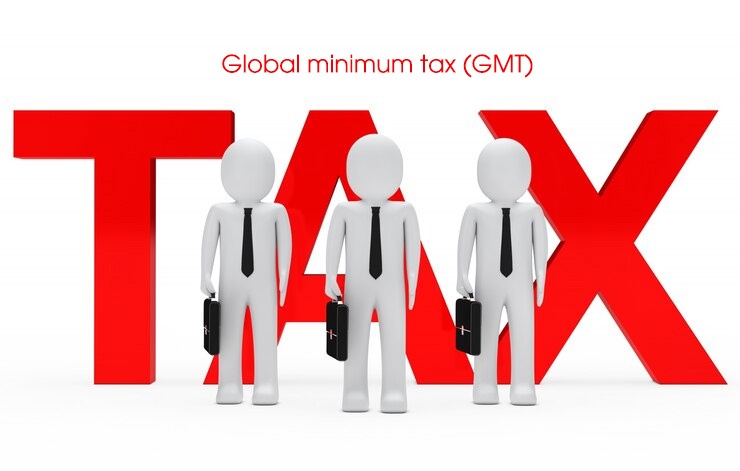Vietnam primed for GMT adoption
The National Assembly (NA) last week passed a resolution on the imposition of top-up corporate income tax (CIT) of 15 per cent under the Global Anti-Base Erosion (GloBE) model rules, which will take effect on January 1 next year until the country’s new law on CIT is released, covering the contents of top-up CIT under GloBE model rules.
Under the resolution’s Article 2 on taxpayers, the taxpayers in Vietnam include a member company of a multinational corporation (MNC) with a turnover equivalent to €750 million ($821 million) or more in the consolidated financial statements of the ultimate parent company for at least two of the four years immediately preceding the fiscal year.
 |
| Vietnam primed for GMT adoption, illustration photo/ Source: freepik.com |
However, some entities are free from the tax, including government and international organisations, non-profits, pension funds, investment fund parent companies; real estate investment parent companies; and organisations with at least 85 per cent of asset value owned directly or indirectly through the aforementioned organisations.
In December 2021, the Organisation for Economic Co-operation and Development published the GloBE model rules, which aim to impose a global minimum tax (GMT) of 15 per cent on MNCs with a revenue in excess of €750 million ($821.62 million) from 2024. In doing so, the effective tax rate has to be calculated in the jurisdiction where an MNC has a taxable presence.
The starting point for calculating the effective tax rate is the financial accounting net income of an entity, with certain amendments. For the purposes of calculating the effective tax rate, the income tax reported in the financial statements, including the movements in the deferred tax position, is relevant.
For Vietnam, the imposition of the GMT will help ensure the country’s right to levy the tax, in line with the international practices and trend currently deployed by so many nations.
“It will also be suitable to the Party’s direction and policy on improving the state budget and international integration,” said the National Assembly Finance and Budget Committee. “In addition, it will also clearly demonstrate the transparency of Vietnam’s investment climate and meet requirements of some major foreign investors operating and wishing to pay the top-up CIT in Vietnam, as from the tax-calculating period of 2024.”
The implementation of this GMT has earned consensus in participation of over 100 nations. Many countries have legislated these GloBE model rules to apply to the tax-calculating period of 2024, the committee said.
According to the committee, if Vietnam fails to legislate regulations on GMT, investment-exporting countries will be able to collect top-up CIT of 15 per cent from MNCs that have projects in Vietnam and are paying an actual CIT rate of below 15 per cent.
“Therefore, to maintain Vietnam’s taxing rights in the context that countries exporting investment in Vietnam will implement the GMT from the 2024 tax-calculating period, it is necessary for Vietnam to promulgate a legal document in order to lay a legal foundation for foreign-invested enterprises (FIEs) subject to the GMT to be able to declare and pay top-up CIT in Vietnam instead letting them pay this sum of tax in their mother nations,” the committee said.
“Furthermore, the early enactment of this resolution manifests Vietnam’s determination in implementing the GMT from January 1, 2024, strengthening investors’ confidence in the country’s legal environment.”
According to a government report on assessing the impact of the resolution, based on 2022 CIT data analysis, it calculated that over 120 FIEs will be subject to the resolution, with a total amount of top-up CIT of about $616 million.
Regarding domestic businesses, the government report estimates that six businesses will be subject to the resolution, with an estimated amount of income inclusion rule of around $3 million that can be collected from their overseas investments - in cases where the investment-receiving countries do not apply the GMT.
| Tran Hoang Ngan - National Assembly deputy Ho Chi Minh City Applying the GMT will help Vietnam attract foreign investment from all over the world, ensuring transparency and fairness between countries. Some have asked what gains and losses Vietnam will have when applying the GMT. I think we will gain a lot. Firstly, we can ensure the legal rights and interests of Vietnam. Second is that we will get a top-up tax from the GMT. According to the assessment of the General Department of Taxation, among around 620 MNCs, more than 1,000 of their member companies are present in Vietnam, and it is likely that we can collect that tax. Third is to ensure fairness and equality between domestic enterprises and foreign enterprises and investors. Recently, we have provided huge incentives for foreign investors, leading to domestic businesses also losing some investment opportunities. Thus, we collect GMT to ensure fairness. Fourth is to demonstrate progress and transparency in Vietnam’s tax management system, and the country’s business and investment environment is approaching the general trend of the world. Finally, we still retain preferential policies for businesses that are not subject to the GMT. Vu Tien Loc - National Assembly deputy, Hanoi Promulgating this resolution is not mandatory as Vietnam is not a member of the OECD. However, to ensure national interests, we have no other choice. This resolution will have a huge impact, reducing the attractiveness of the investment and business climate in our country, especially for strategic investors in the existing context of very fierce competition in attracting foreign investment. To minimise adverse impacts, I suggest that along with promulgating this resolution, the NA also needs to issue an additional resolution on preferential and support policies for businesses in order to maintain an attractive investment environment. This aims to meet two goals at the same time: promoting high-quality investment capital flows into our country in accordance with the economic development strategy of the Party and state, and not violating international commitments and not going against the integration trend. Our promulgation of new policies to encourage and support investment is not a technical measure, nor is it a measure for us to circumvent and compensate for losses to investors because they had to pay the top-up CIT, as this is a violation of OECD principles. Investment support policies need to ensure a principle of fairness, aiming at all businesses that achieve the specific criteria that our policy aims at without discrimination - that is, businesses that are subject to the top-up CIT or not. Dinh Thi Phuong Lan - National Assembly deputy Quang Ngai province To have a more convincing basis, it is recommended that the government continue to carefully evaluate and research the practice of applying the GMT in countries with similar scale, economic structure, and special characteristics, especially in the 23 countries and territories with CIT rates lower than 15 per cent. GMT provisions are not currently mandatory, but if they choose to apply them, countries will have to do so consistently under guidance suitable to the GloBE model rules. Therefore, it is necessary to evaluate in full and in detail the impact of the regulations guiding the implementation of the GMT. The development of legal documents to comply with OECD regulations needs to be detailed and specific, ensuring legislative sovereignty. The imposition of top-up CIT not only helps combat the erosion of the GMT but also to prevent profit shifting and transfer pricing (TP). Therefore, to control, manage, and prevent TP during the operation of foreign-invested enterprises, it is necessary to synchronously implement solutions, especially perfecting database to improve the effectiveness of TP control and tax management. The government also needs to ensure human resources, boost administrative reform, analyse economic impacts, forecast revenue sources, and adjust the IT system in a manner compatible with international standards in market valuation. |
 | How will GMT affect FDI in Vietnam? Vietnam has offered generous tax incentive policies to foreign investors in recent years to encourage them to establish manufacturing plants and processing facilities across the country. In return, such policies have strengthened Vietnam’s position as one of the region’s large manufacturing hubs and key participants in global supply chains. |
 | Global tax shift forces inevitable adjustment As the country adapts to the global minimum tax, Vietnam’s future as a prime investment destination is under the lens. Duong Hoang, partner and head of Tax at KPMG in Vietnam, offered VIR’s Luu Huong insights into this transformative phase, highlighting the synergies between Vietnam’s tax strategy and its quest to remain a magnet for foreign funding. |
 | Vietnam set to implement global minimum tax Vietnam is poised to adopt global minimum tax (GMT) regulations, a move set to impact 122 foreign investment conglomerates and strengthen the country's fiscal framework in line with international standards. |
 | Vietnam will remain FDI magnet with global minimum tax in place On November 29, the National Assembly of Vietnam approved a resolution on applying additional corporate income tax following the Global Anti-Base Erosion Rules, which is expected to have an impact on foreign direct investment (FDI) inflows into Vietnam. |
What the stars mean:
★ Poor ★ ★ Promising ★★★ Good ★★★★ Very good ★★★★★ Exceptional
 Tag:
Tag:
Related Contents
Latest News
More News
- Banking sector targets double-digit growth (February 23, 2026 | 09:00)
- Private capital funds as cornerstone of IFC plans (February 20, 2026 | 14:38)
- Priorities for building credibility and momentum within Vietnamese IFCs (February 20, 2026 | 14:29)
- How Hong Kong can bridge critical financial centre gaps (February 20, 2026 | 14:22)
- All global experiences useful for Vietnam’s international financial hub (February 20, 2026 | 14:16)
- Raised ties reaffirm strategic trust (February 20, 2026 | 14:06)
- Sustained growth can translate into income gains (February 19, 2026 | 18:55)
- The vision to maintain a stable monetary policy (February 19, 2026 | 08:50)
- Banking sector faces data governance hurdles in AI transition (February 19, 2026 | 08:00)
- AI leading to shift in banking roles (February 18, 2026 | 19:54)




















 Mobile Version
Mobile Version